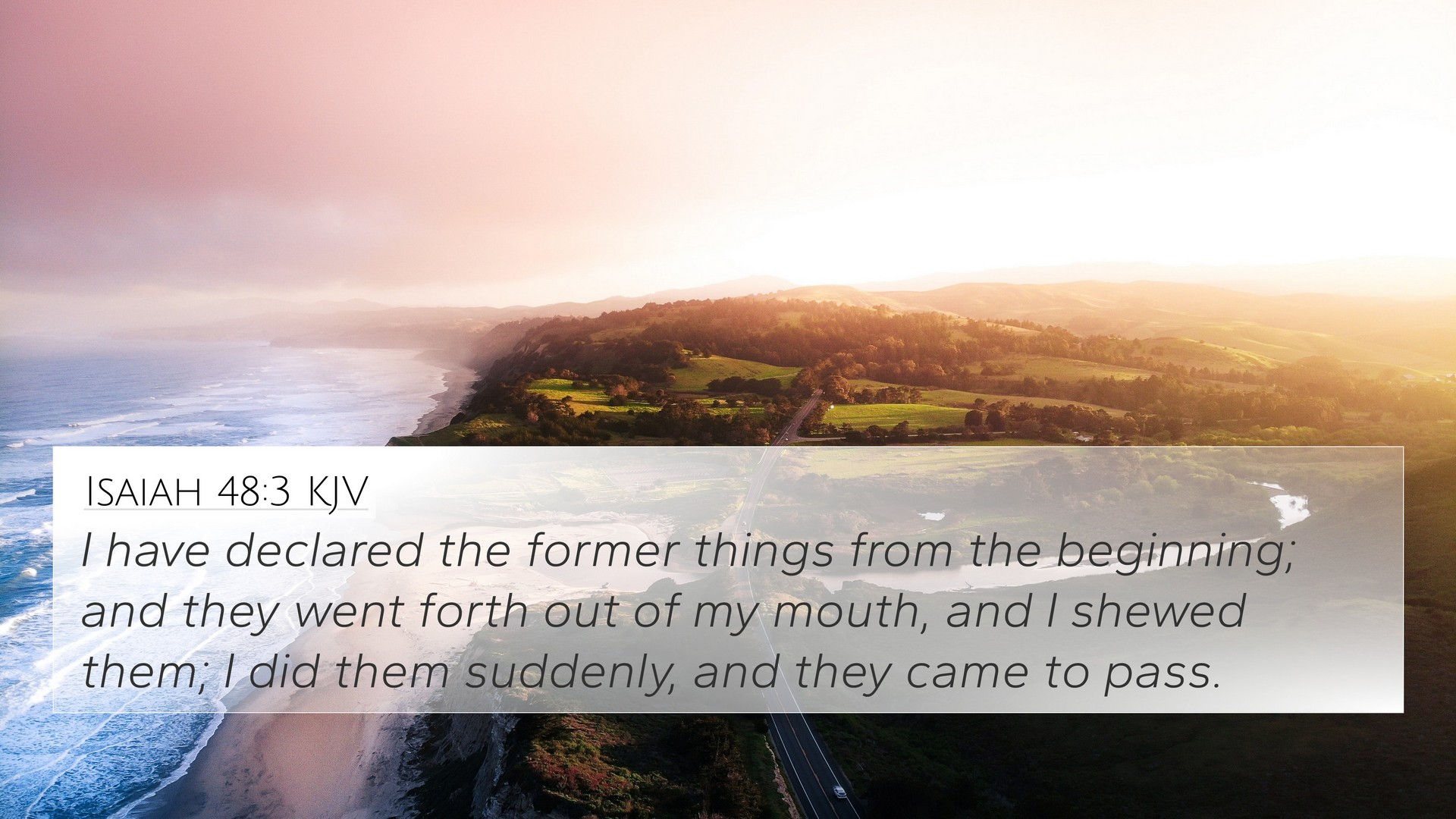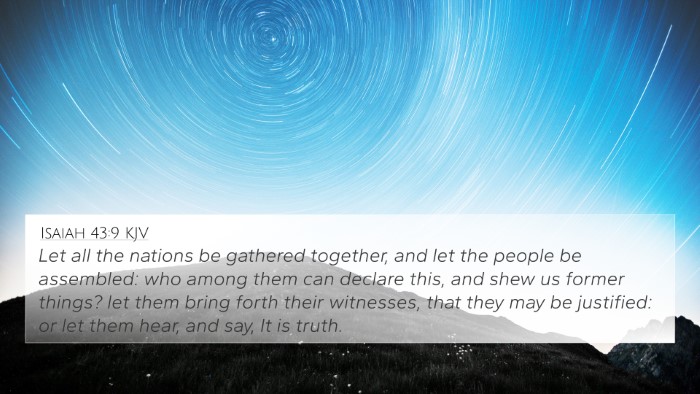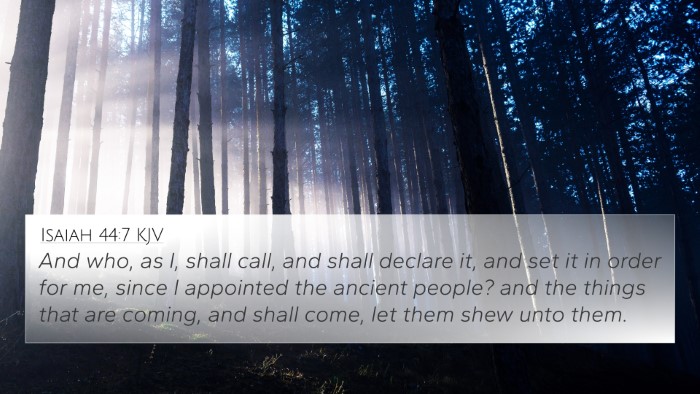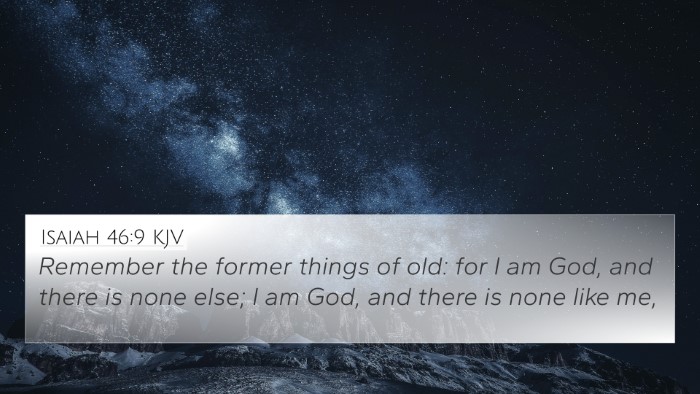Understanding Isaiah 48:3
Isaiah 48:3 states, “I have declared the former things from the beginning; they went forth out of my mouth, and I showed them; I did them suddenly, and they came to pass.” This verse reveals God’s sovereignty and prophetic power, showcasing how His declarations come to fruition in history.
Contextual Analysis
The book of Isaiah is known for its rich prophetic literature and its emphasis on God's judgment, hope, and salvation. Isaiah 48 comes during a time when the Israelites are in exile, and God is reminding them of His omnipotence and faithfulness. The assertion that God has declared the former things indicates that He has control over time and events. Such declarations are not random; they are deliberate and serve a purpose.
Commentary Insights
- Matthew Henry: Henry notes that God's declarations are not only predictive but also retrospective, reminding Israel of their history and His previous interventions. He emphasizes that God’s sudden actions demonstrate His might and timing in fulfilling His promises.
- Albert Barnes: Barnes explains that God’s pronouncement of future events is evidential. He argues that the fulfillment of prophecies serves as a testament to the truth of God’s word. The declaration implies a challenge to false idols who cannot predict the future.
- Adam Clarke: Clarke reflects on the immediacy of God's actions as evidenced in the verse. He mentions that the phrase “suddenly” aligns with God’s ability to intervene in human history without delay, which is a manifestation of divine authority.
Thematic Connections
This verse can be analyzed through the lens of several themes that recur throughout Scripture:
- Prophecy and Fulfillment: Isaiah 48:3 directly links to other verses like Isaiah 46:10 and Isaiah 55:11, emphasizing God's control over prophetic fulfillment.
- Divine Sovereignty: It connects with Psalm 33:9, which speaks to God's command bringing creation into existence, demonstrating His absolute authority.
- Remembrance of God's Acts: References to Deuteronomy 8:2 highlight the importance of remembering God’s past deeds as foundational to faith.
- God’s Power in History: Jeremiah 1:12 echoes God's vigilance over His word to perform it.
- Assurance of God's Promises: This verse reassures believers similarly to Romans 4:21, where faith in God's promises is paramount.
- Human Responsibility vs. Divine Intervention: This theme is explored in 1 Peter 5:7, pointing towards the relationship between human action and God’s sovereignty.
- Futility of Idolatry: The contrast to idols mentioned in Jeremiah 10:5 highlights the vain nature of false gods compared to God’s omniscience.
- Assurance and Hope: Connections are found in Romans 8:28, where all things work together for good, reflecting the certainty of God's plan.
- God's Faithfulness: 2 Timothy 2:13 reflects the steadfastness of God even when individuals are unfaithful.
- Revelation of God’s Nature: Isaiah 48:3 serves as a precursor to the revelation of God through Christ as seen in John 1:1-3.
Cross-Referencing Biblical Texts
To develop a deeper understanding of Isaiah 48:3, one can utilize tools such as a Bible concordance or a Bible cross-reference guide. These resources can help in finding connections between Bible verses, which enhance our insight into the Scriptures.
How to Utilize Bible Cross-Referencing
When studying a verse like Isaiah 48:3, consider these methods:
- Identify Key Themes: Focus on major themes such as prophecy, divine interventions, and God's sovereignty.
- Use a Bible Concordance: Look up terms like “declare” and “fulfill” to discover related verses.
- Comparative Verse Analysis: Compare the mention of God’s declarations in the Old Testament with their fulfillment in the New Testament.
- Group Related Verses: Organize thematically to gain insight into how these verses interact.
- Journaling Insights: Keep notes on what these connections reveal about God’s character.
Conclusion
Isaiah 48:3 is a profound reminder of God’s authority, wisdom, and faithfulness in prophecy and historical actions. By engaging in comparative Bible verse analysis and cross-referencing Biblical texts, believers can deepen their understanding and appreciation of God’s word and His plans through time. This reinforces faith and encourages believers to recognize God's handiwork in their lives and history.
Further Study Suggestions
- Explore the implications of God’s prophecies in the context of other biblical events.
- Study the interactions between Old Testament prophets and their New Testament fulfillments.
- Participate in group Bible studies that focus on Bible cross-reference study methods.
- Develop a personal Bible reference system for sustained engagement and insight.
- Utilize comprehensive Bible cross-reference materials to broaden your study.















